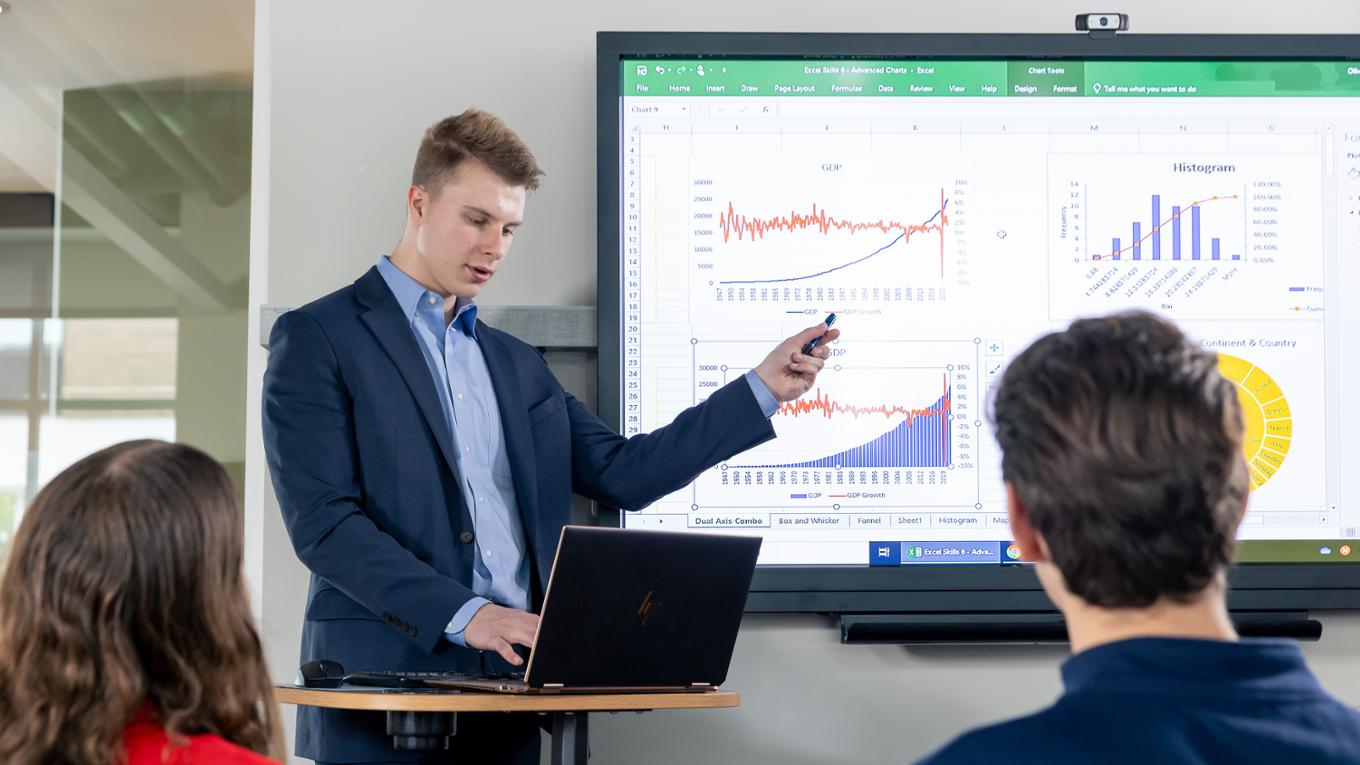Economics
Economics is a social science that studies the way that people, groups, institutions, and governments operate with limited resources to satisfy needs. By blending data, analytics, and human behavior, Economists uncover patterns in markets, jobs, prices, and investments to respond to challenges and opportunities. Their work helps predict outcomes, guide policy, and create smarter solutions in a rapidly evolving world.
Why Study Economics at the Palumbo-Donahue School of Business?
Our program is designed to bridge theory with real-world application. At Duquesne, we focus on data analytics, statistical theory, and quantitative methods—teaching you how to make informed, strategic decisions using cutting-edge tools. Gain in-demand analytical and problem-solving skills that translate directly to the business world.
Discover Duquesne's Distinctive Educational Experience
You will benefit from an immersive, experiential education model. Whether through
high-impact networking events, expert faculty mentorship, or a business-focused curriculum,
our Economics major goes beyond the classroom and provides experiences not found
in other schools.
- Econometrics: Gain hands-on experience in our required Econometrics and Advanced Econometrics courses. In the capstone course, Advanced Econometrics, you will design and execute independent research projects rooted in economic theory and supported by real-world data. Then, apply advanced statistical techniques to topics that reflect your interests, developing research and data analysis skills.
- Exclusive Networking Opportunities: Attend the Economic Club of Pittsburgh monthly meetings, featuring top industry speakers. Board members from the Economic Club also serve as mentors and judges for the Advanced Econometrics capstone.
- Expert Faculty and Connections: Learn from professors with direct ties to economic think tanks, government agencies, and legal experts. The School sponsors the Economic Club of Pittsburgh, with prominent faculty serving on its board.
Program Information
Our curriculum is steeped in data analytics. Economics majors take a number of upper-level courses in data analytics including two courses in Econometrics that require students to complete several rigorous research projects.
Program Type
Major, Minor
Degree
Bachelor's
Duration
8 Semesters
Required Credit Hours
Minimum of 120
Modality
In-Person
From Our Alumni
Career Opportunities
Invest in Your Future
Economics majors are in high demand across a wide range of industries thanks to their strong analytical skills, quantitative reasoning, and ability to interpret complex data. The versatility of an Economics major opens the door to impactful careers in both the private and public sectors, as well as graduate study in fields such as law, business, public policy, and economics itself.
- Consulting & Finance: Sought after by economic and financial consulting firms, investment banks, commercial
banks, and
accounting firms, career paths for economists include financial analyst, economic consultant, investment associate, or credit
risk analyst. - Healthcare & Government: With growing demand for data-driven decision-making in healthcare and public policy,
economists
play a key role in analyzing costs, outcomes, and the effectiveness of programs. - Law & Policy: Economics is an excellent major for law school preparation. The discipline enhances
your skills in logical reasoning,
critical thinking, and understanding regulatory environments. - Business & Technology: In our data-driven economy, businesses rely on economists to guide strategic planning,
market research,
pricing strategy, and business intelligence.
Economics Majors Employment
Recent Duquesne Economics majors have found positions in a variety of major corporations, including:
- BNY
- Federated Hermes
- Highmark Health
- Keybank
- PNC
- Offices of the United States Attorneys
Study Abroad Recommendations
Economics majors who intend to study abroad are strongly encouraged to do so either in their sophomore year or during a summer term.
Economics as a Second Major or Minor
Combining Economics as a double major or minor with another business major gives students a competitive advantage in the job market.
Curriculum
- Bridges Requirements: 19 credits of University-wide courses taken by all students
- Business Core Required Courses: 51 credits plus 3 additional credits of required courses taken by business students
- Economics Major Required Courses: 18 credits
- Major Specific Electives: 3 credits
- Open Electives: 26 credits
- Graduation Requirements: Students must earn a minimum overall 2.0 GPA.
- ECON 301 Intermediate Microeconomics (3 credits)
- ECON 302 Intermediate Macroeconomics (3 credits)
- ECON 345 International Economics (3 credits)
- ECON 353 Public Economics (3 credits)
- ECON 481W Econometrics (3 credits)
- ECON 484W Economics Capstone: Advanced Econometrics (3 credits)
- ECON 319 Economics of Sports (3 credits)
- ECON 320 Labor Economics (3 credits)
- ECON 331 Environmental Economics and Policy (3 Credits)
- ECON 490W Economics Senior Thesis (Independent Study) (3 credits)
- FINC 433W Financial Markets and Institutions (3 credits)
The elective can be dropped from this major when paired with a second business major or minor.
- ECON 201
- ECON 202
- Complete four Economics courses at the 300 level or above



